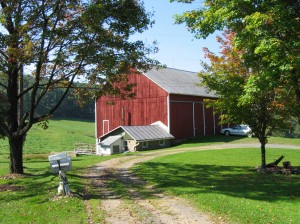
There are costs related to the donation of a conservation easement. NPC’s staff can assist you in determining which of these costs will apply to your situation.
NPC does not charge for the staff time spent evaluating the property and developing a conservation easement. NPC will pay the cost of recording the conservation easement in the local land records.
Survey
In order for a conservation easement to adequately protect a property, the property description must be based on a survey with any reserved building rights clearly located. A conservation easement that covers an entire property may be based on a previous survey, such as the one the landowner may have from his or her purchase of the property. If the conservation easement allows for development in particular areas of the property or covers only a portion of the property, those areas may need to be surveyed. NPC staff can advise the landowner on the requirements for his or her particular property.
Appraisal
A conservation easement donation to NPC may enable the landowner to claim a federal income tax deduction. The IRS views the donation of a qualified conservation easement as a charitable contribution. However, in order to claim a tax deduction, the value of the conservation easement must be determined through a qualified appraisal, done by a qualified appraiser. NPC can provide the landowner with the IRS guidelines for a “qualified appraisal”.
Legal Fees
The conservation easement agreement used by NPC is based on the Pennsylvania model easement, created by the Pennsylvania Land Trust Association. NPC’s staff will discuss the structure and content of the document with the landowner.
NPC strongly advises that the landowner’s attorney review the conservation easement.
NPC requires a title search. The search will need to go back farther than is normally required for a mortgage.
Stewardship Fund Donation
In accepting the donation of a conservation easement on a property, NPC takes on stewardship responsibilities to ensure that the integrity and terms of the conservation easement are not violated. These responsibilities include annual monitoring and enforcement of the terms of the easement in perpetuity. They are permanent obligations that NPC must have the capability to carry out 20, 50, and 100 years or more into the future. Therefore, NPC has always requested that each donor of a conservation easement also make a stewardship contribution to cover the responsibilities that accompany the conservation easement. The stewardship contribution helps to ensure that the terms of the conservation easement will be in full force long after the current owners have departed. All stewardship contributions are kept in NPC’s stewardship account, which is used only to meet the costs of monitoring and enforcing conservation easement agreements. Guidelines for contributions to the Stewardship Fund are available from NPC’s staff.
Other Professional Fees
Although donating a conservation easement to NPC may be a charitable contribution, NPC cannot guarantee any type of tax deduction. Compliance with the law and determination of deductibility and tax benefits are the responsibility of the landowner and the landowner’s advisors. NPC strongly recommends that anyone considering donating a conservation easement contact appropriate counsel and work with them during this process.
In addition, if a property is mortgaged, the landowner will need to obtain an agreement from the mortgage holder to subordinate its interest so that the easement is not extinguished in the event of foreclosure. Some banks charge for executing such agreements.